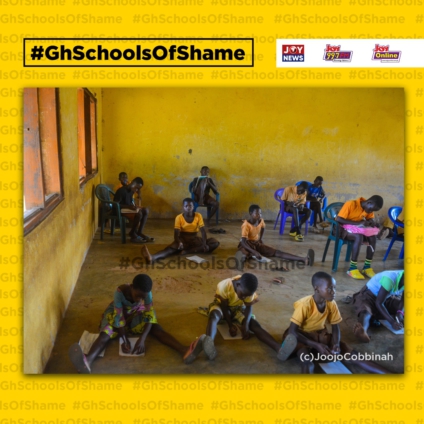One of the first lessons I learnt from my first boss as a young Public Relations Officer was to always have a ‘To Do’ list and update it daily.
Mrs. Ruth Gyang told me that in doing so, I should bear in mind that I work eight hours a day. Indeed, she referred me to the Biblical injunction- “Everything is permissible for me,” but not everything is beneficial….”- 1 Corinthians 6:12, and the Ga saying, “AfeↃ nↃni hehia, dani afeↃ nↃni sa”, to wit- you do what is necessary before what is important.
That’s because she realised that some of the numerous tasks she assigned me fell through when the time for accountability was at hand. In other words, I dropped some of the many balls that I was asked to juggle. The ‘To Do’ list was therefore to help me allot time for each task in order of priority and deliver efficiently.
Upon being introduced to this task management tool, I did not have much difficulty appreciating it, because I recognised that it is akin to the concept of Scale of Preference that I learnt about in O-Level economics. Except that in the case of the Scale of Preference, one has to forgo some of the items in favour of others. In which case, the real cost of the chosen item is the opportunity cost of not satisfying the forfeited one.
It is worth pointing out the reason for the similarity in the two concepts- scarcity. While the To Do list has to do mainly with allotting time, which is finite, to tasks, the Scale of Preference becomes necessary because of scarce financial resources.
Also related to the To Do list and Scale of Preference is the concept of prioritisation. This enables the one involved to decide on which activity to tackle first depending on the urgency and the need for it. Incidentally, prioritisation is also necessitated by either limited time or inadequate funds.
The implication of all this is that whether as an individual or a nation, a careful selection of which tasks, projects or policies to focus the limited available resources on, is critical. Failure to do so brings one face to face with the proverbial, “you have bitten more than you can chew.” The consequence of which is that you choke, and die if you are not lucky.
Schools of shame or fame?
Like workers with busy schedules, every Ministry, Department and Agency (MDA) in Ghana has a To Do list. This comes in the form of mandates. The Ministry of Education and its agency, the Ghana Education Service, have their mandates as prescribed by law.
While the Ministry derives its raison d'être from the Civil Service Law, 1993 (PNDCL 327), the GES exists to fulfill the provisions of the Ghana Education Service Act, 1995 (ACT 506).
In addition, Article 25(1) (a) and (e) of the 1992 Constitution empowers these two public service organisations to ensure the existence of Free, Compulsory Universal Basic Education (FCUBE). Specifically, Article 25 (1) (a) states that “basic education shall be free, compulsory and available to all” and (e) “the development of a system of schools with adequate facilities at all levels shall be actively pursued.”
To be able to effectively and efficiently execute this mandate, the MOE and GES, like most ministries, usually develop medium term plans for the sector. This is basically a To Do list made up of what programmes and projects have been prioritised for execution.
Somehow, the situation on the ground, as regard the quality of basic education, is a far cry from what the FCUBE envisages- “…adequate facilities at all levels…” do not exist. Instead, schools under trees, schools without furniture, schools without textbooks and pupils lying on the floor to write, characterise many of these basic educational institutions. Needless to add that the School Feeding Programme, through which these young ones are supposed to be fed one hot nutritious meal a day, is riddled with challenges.
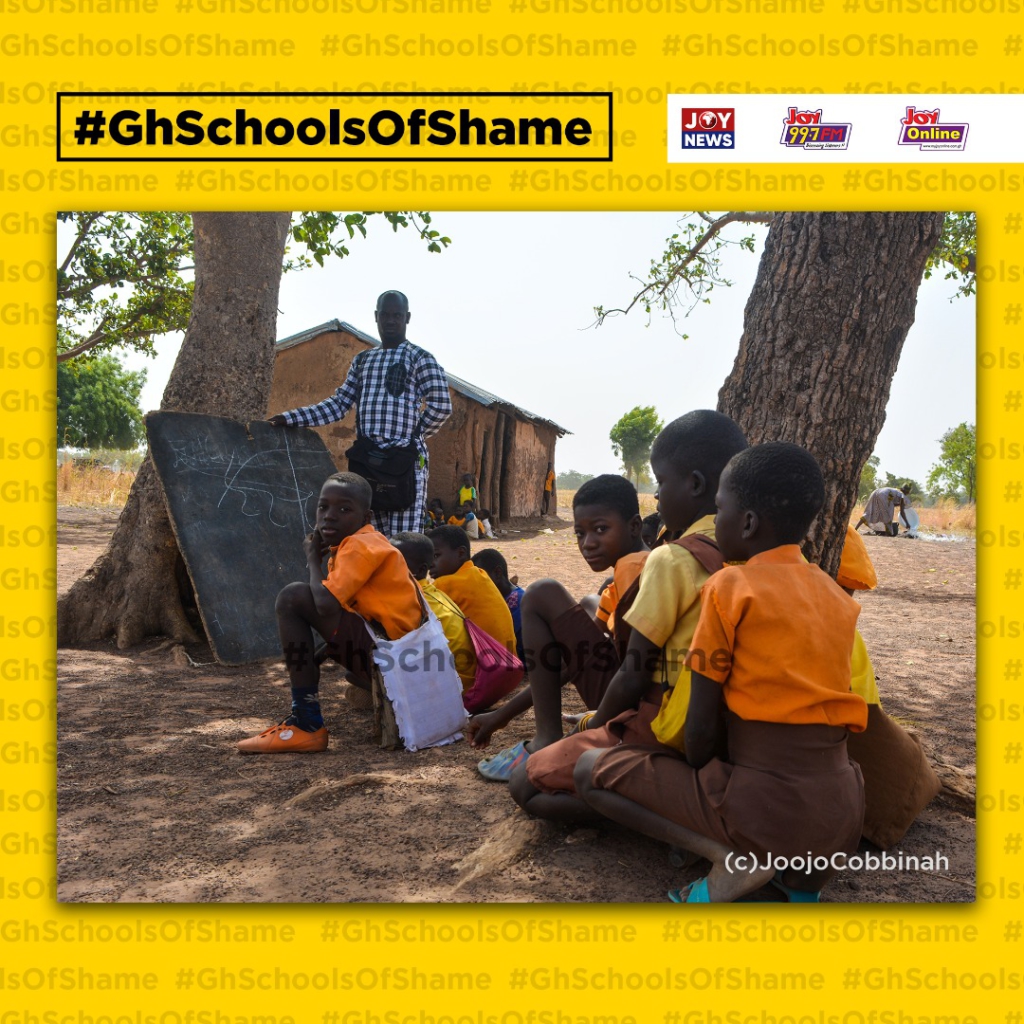
It is for this reason that JoyNews’ features editor, Joojo Cobbinah set out to highlight the state of affairs so that the duty bearers will awaken from their slumber and implement strategies that they have outlined in their plans.
The “Ghana’s school of Shame” documentary therefore highlighted some education infrastructure challenges in three districts of the country. In the feature, some challenges students go through to access education in some parts of the country were also brought to light.
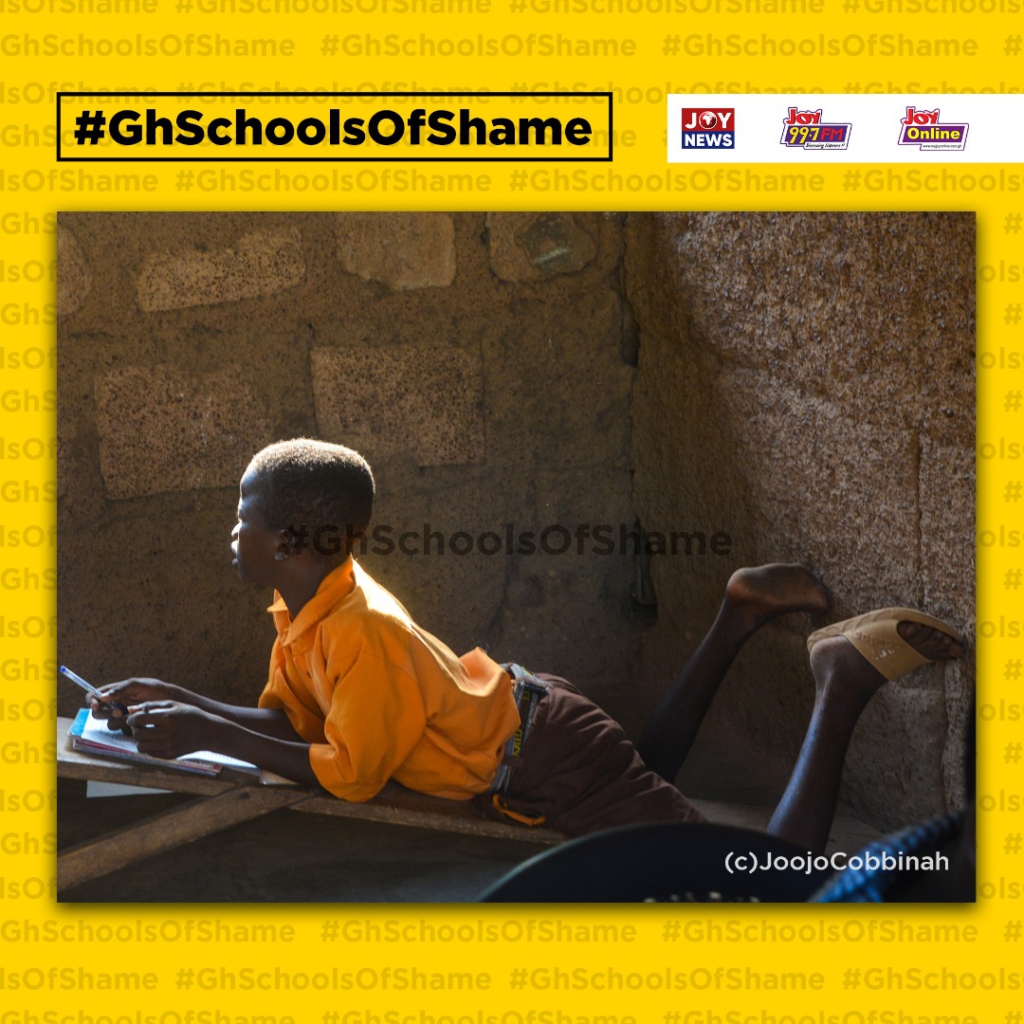
For example, about 45 per cent of schools in the Krachi Nchumuru District were found in awful shape. Over 7,000 children have no furniture. In the Kpandai District, many of the children reportedly lie on the bare floor to write notes and examinations. In some cases, the pupils did not have textbooks. I bet the situation in a number of schools, right here in Accra, will not be any better.

Unfortunately, upon sighting the documentary, the Minister of Education, Dr. Yaw Osei Adutwum felt ashamed, not because of the poor state of the schools featured in the video, but because Joojo chose to highlight the challenges bedeviling basic education in the country, instead of focusing on what he termed “great things” happening in the sector.
Read him- “Recently I saw some TV programming where they were talking about Ghana’s Schools of Shame and I was ashamed, because of all the great things happening in the country, we want to focus on the negative and get the world to know that there are negative things in Ghana.”
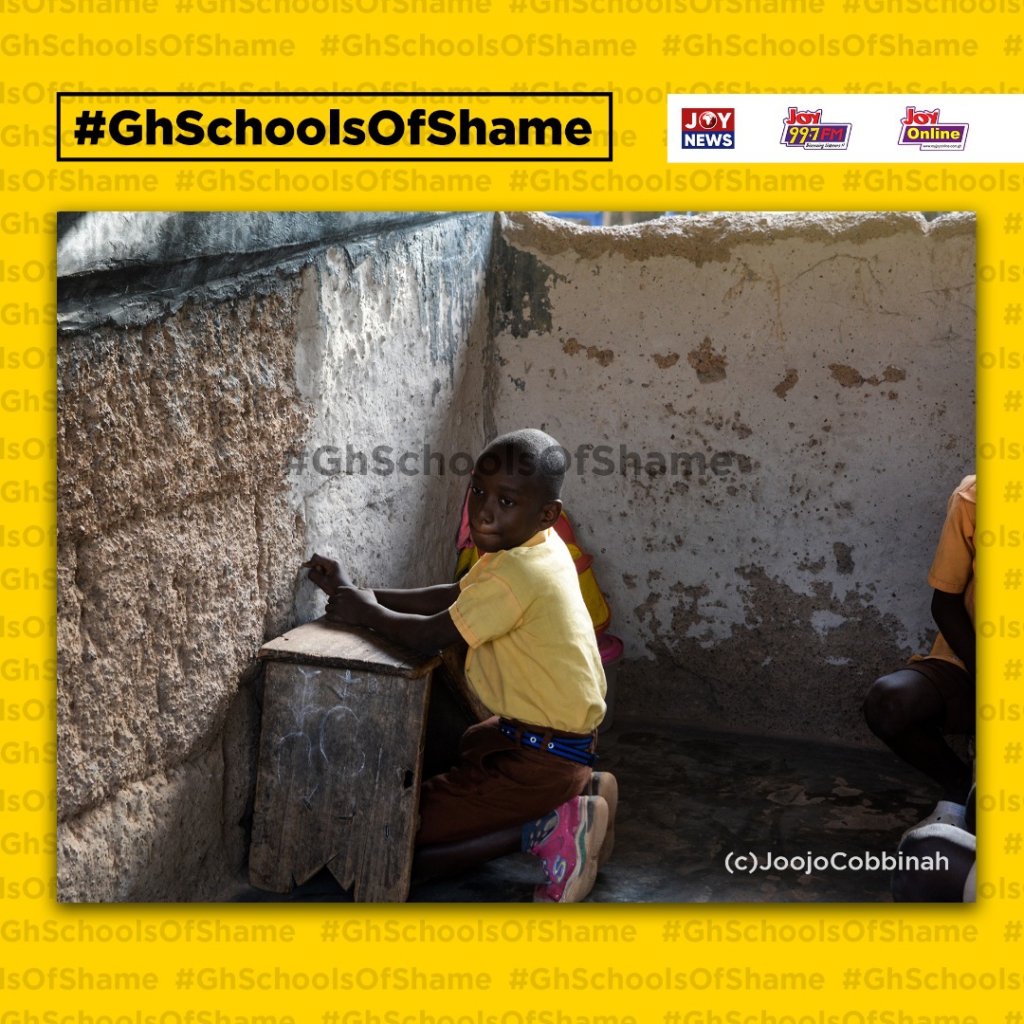
Whoever told the Minister that the media exist to showcase his “great things” should please correct that mistake. Tell him that is the job of the Ministry’s Public Relations outfit. As for journalists, we are trained to look for incidents involving humans who are biting dogs. Not the other way round.
Well, thankfully, Dr. Adutwum has recovered from the shame. Consequently, over 5,000 desks have been dispatched to be distributed to the affected schools. Now he says, “I’m a fixer, not a talker.” That’s fine. We expose, you fix. That’s our job.
Nonetheless, it seems the expose by the JoyNews documentary is only a tip of the iceberg. That is because the National Programmes Manager of the Ghana National Education Campaign Coalition, Festus Longmatey, said on PM Express on Wednesday, February 1, 2023 that some school authorities turn prospective pupils away due to lack of infrastructure.
“There is this mum who is complaining of not being able to send her two children to school because of lack of furniture for the children to use in the school. So the school basically, they’re refusing to admit these children just for the fact that they don’t have furniture to accommodate these children,” he said.
The President of the Ghana National Association of Teachers (GNAT), Reverend Isaac Owusu, has also revealed the true cause of the situation.
He said on the same show, that, “…it looks as if the policy formulators…majority do not believe in the basic education system. The reason is simple, these people do not have their children in these public schools. Let’s ask ourselves, how many DCEs or MCEs have their children or grandchildren in these public basic schools?” he quizzed.
Besides the infrastructure challenges, the School Feeding Programme, as noted early on, is said to be on the verge of collapse because the caterers want an increase in the amount paid as feeding fee. That’s at the basic level. At the Senior High School level, suppliers of food stuff to the schools are also reported to be up in arms over non-payment for goods supplied. This difficulty, if not resolved, will soon result in the pupils and students going to lectures/classes on empty stomachs.
Needless to add that the SHSs have their own problems- inadequate classroom and dormitory infrastructure as well as inadequate teachers.
1 student, 1 tablet
In the midst of such grave deprivation in our basic and second cycle institutions, our IT guru of a Vice President is going round promising every student in SHS a tablet.
Dr. Mahamudu Bawumia says this is aimed at equipping the students with the relevant materials for their studies as part of government’s digitisation agenda.
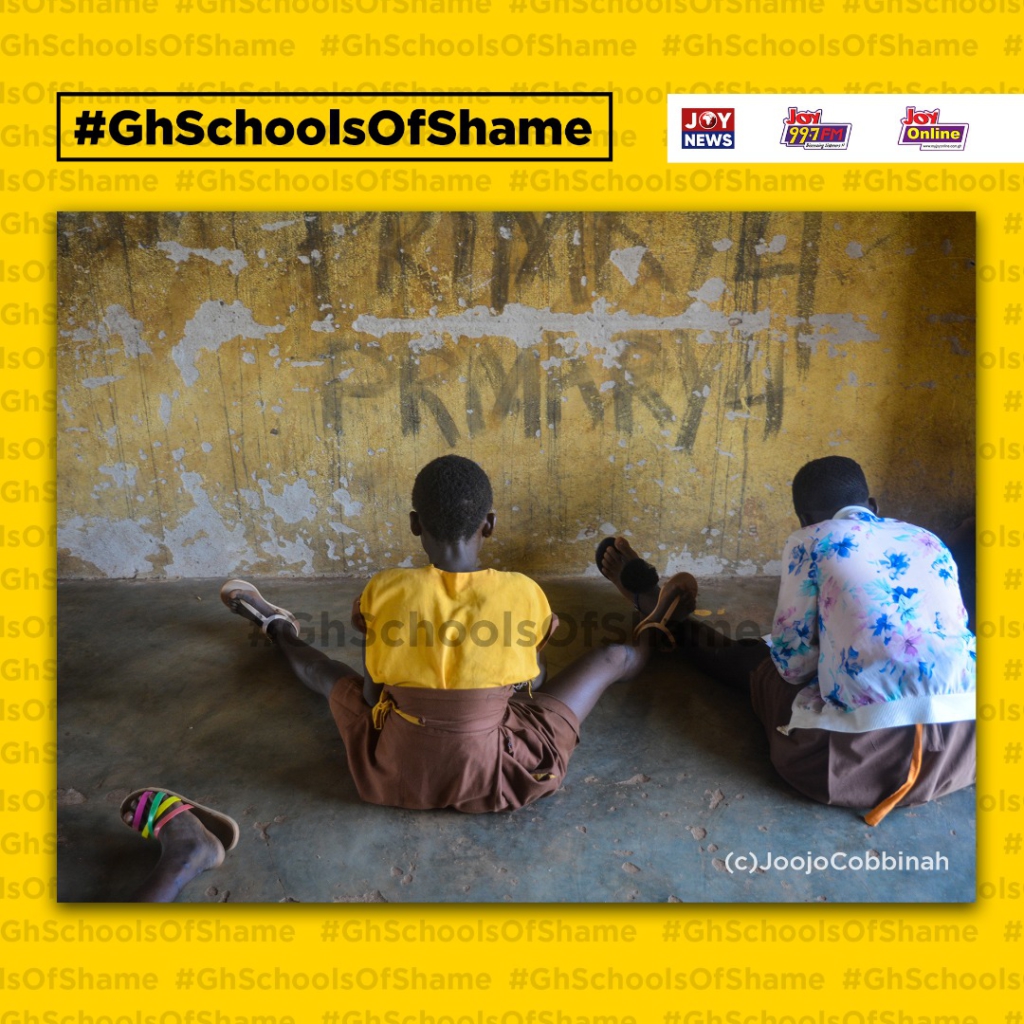
“This year, we are on course to provide all Senior High School students in Ghana with tablets which are loaded with textbooks on them for their studies. That’s a very game-changing development. We will have past questions preloaded on these tablets that will be distributed,” he declared.
Dr. Bawumia announced this ‘laudable’ initiative at the 2023 New Year School at my Alma-mater- University of Ghana, Legon on Tuesday, January 17. I put laudable in inverted commas because upon hearing the announcement I wondered if this is a priority.
Important, yes. But is it necessary at this time? Is this the item that should occupy the top position on our To Do list in the education sector? Not desks, not expansion in infrastructure to prevent pupils from crossing rivers to and from school and possibly die in the process, not free uniforms for pupils in deprived communities, not reliable supply of food, but electronic tablets?
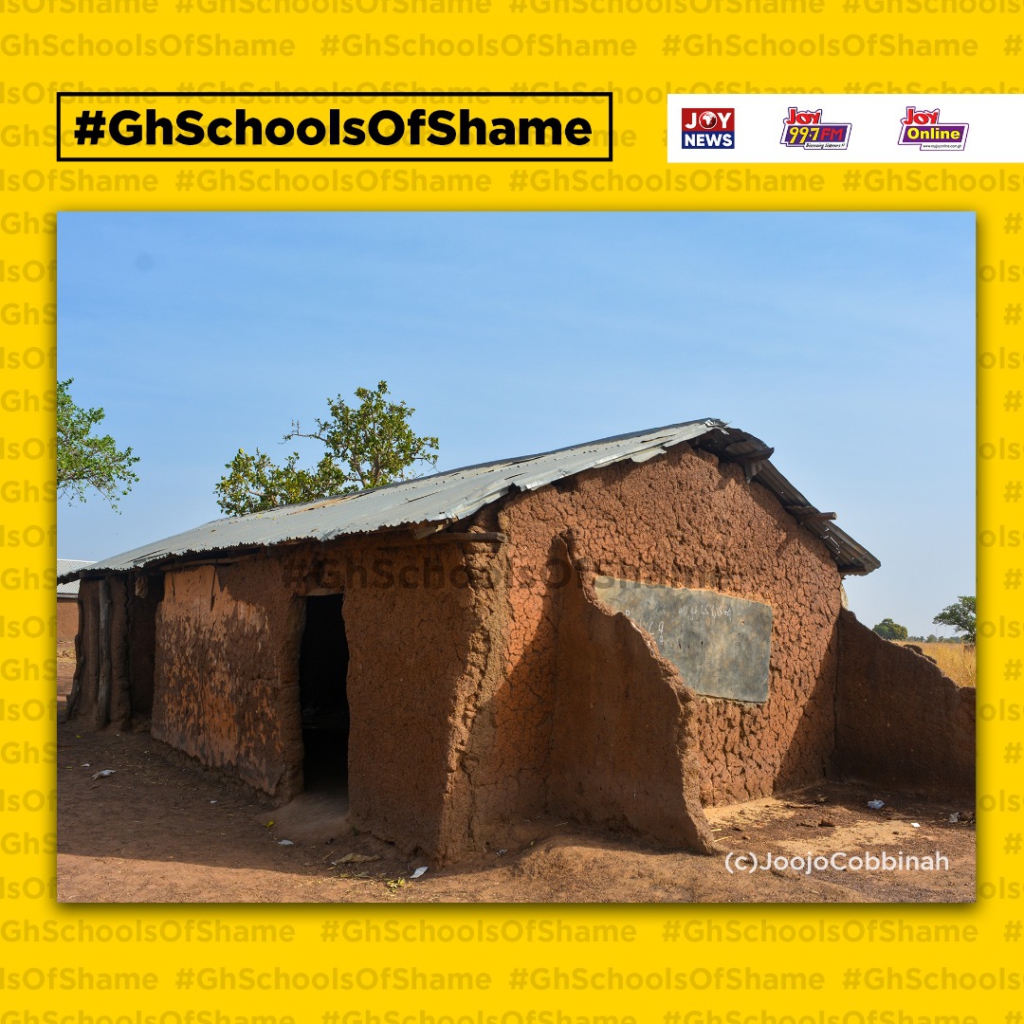
Oooh! Why do I smell circumstantial non-righteousness in anticipation of 2024?
Have you been a president before?
In the run up to the 2016 election, then candidate Nana Addo Dankwa Akufo-Addo (NADAA) and his vice presidential candidate, Dr. Mahamudu Bawumia questioned the competence of the then John Mahama Administration. They used the word ‘incompetent’ to describe then President Mahama so much so that his name became synonymous with the word. ‘Incompetent Mahama’ was the refrain.
At a point, President Mahama could not bear it anymore, so he retorted, “Look at Bawumia, he gets up and says, incompetent Mahama, Incompetent Mahama, Incompetent Mahama. Have you been a president before?”
True to the old adage that says, “Before you criticise a man, walk a mile in his shoes,” now Vice President Bawumia and his boss NADAA find themselves in the eye of the storm. In place of an incompetent tag, for the first time in the history of Ghana, a sitting president was booed for disappointment due to perceived non-performance. Not once, but twice. As for Dr. Bawumia, the name that people call him ‘behind his back’ is ‘Bawuliar.’
That is because many have said that a lot of the promises made in the NPP’s pre-election manifesto have not been fulfilled. They say that those that have been fulfilled are not yielding the desired results. Among these are; 1D1F, Free SHS and Planting for Food and Jobs.
Agenda 111; 1 Village, 1 Dam; 1 Constituency, 1 million Ghana cedis have all proved to be hard nuts to crack. These, among other challenges facing the current government, have made it clear that they have put a huge morsel of food in their small mouth, so to speak- bitten more than they can chew. Or so it seems.
It’s time to go
There is no gainsaying the fact that the responsibilities of government are numerous and diverse. And costly too. That is why the Ministries, Departments and Agencies are equally many and the taxes that we as citizens are obliged to pay in order to fund their operations keep increasing.
Actually, the number and kinds of taxes we pay are so overwhelming anytime I avert my mind to them. Imagine this, Government will not provide you a job, yet if you secure one through ‘whom you know’ and negotiate a salary, government’s cut, which comes in the shape of Income Tax, is deducted before it lands in your bank account.
Whatever is left is also subjected to other direct and indirect taxes such as; Value-Added Tax (VAT), National Health Insurance Levy (NHIL), Ghana Education Trust Fund Levy (GETFL), COVID-19 Health Recovery Levy (CHRL), and Communications Service Tax (CST), to mention a few.
In addition to revenue from these taxes, we get more from Gold, Oil, Timber, Bauxite, Salt, Diamond yet our country is in debt crisis which has necessitated a Domestic Debt Exchange Programme (DDEP) and its associated ‘haircuts.’
This begs the question whether we are PRIORITISING right as a nation. From where I sit, I see many instances of doing what is important but not necessary- the Construction of National Cathedral and 1 tablet, 1 student initiatives are the ones that come to mind immediately.
I therefore call for an effective and efficient management of a logically prioritised To Do list, bearing in mind that resources are scarce and in some cases finite. By so doing, we will not have students browsing on tablets on an empty stomach in classrooms which have no chairs and desks.
Auf Wiedersehen- That’s Good bye in German.
Let God lead!! Follow Him directly, not through any human.
The writer works at Myjoyonline.com. He is also the author of two books whose contents share knowledge on how anyone desirous of writing like him can do so. Eric can be reached via email eric.mensah-ayettey@myjoyonline.com. The two books cost GHC80.00.
Latest Stories
-
Hunter Biden lashes out at George Clooney over father’s 2024 election exit
2 hours -
French cities impose curfews on children after drug violence
2 hours -
Hershey, Nestle, other cocoa companies defeat appeal of child slavery lawsuit
3 hours -
China finds cover-up in lead poisoning of 200 children
3 hours -
Prince George photo released for his 12th birthday
3 hours -
Philippines goods to face 19% tariff, Trump says
4 hours -
Indian vice president’s resignation sparks speculation
4 hours -
Irish government reveals how Apple tax windfall will be spent
4 hours -
Brazilian Supreme Court justice threatens to arrest Bolsonaro
4 hours -
Queen Elizabeth II’s fashion to feature in exhibition
5 hours -
North Macedonia backs Morocco’s autonomy plan as sole basis for resolving Sahara dispute
5 hours -
Coach Lars Björkegren “proud” of Black Queens after penalty defeat to Morocco
5 hours -
Hosts Morocco to take on Nigeria in African women’s final
5 hours -
We were the better team – Queens coach Bjorkegren reflects on WAFCON 2024 semi-final loss
5 hours -
Mali court rejects appeal to release four Barrick employees, judge says
5 hours

